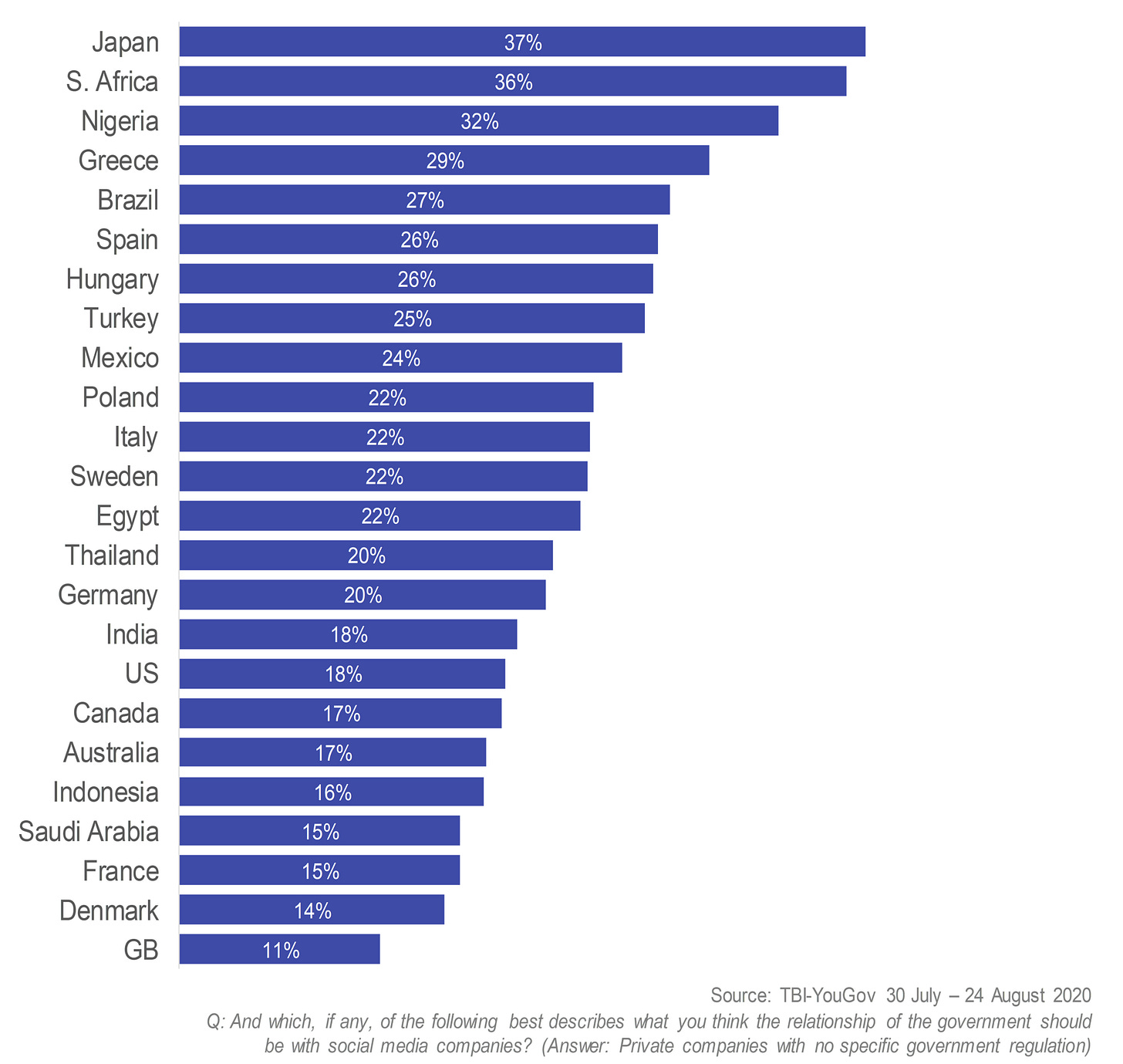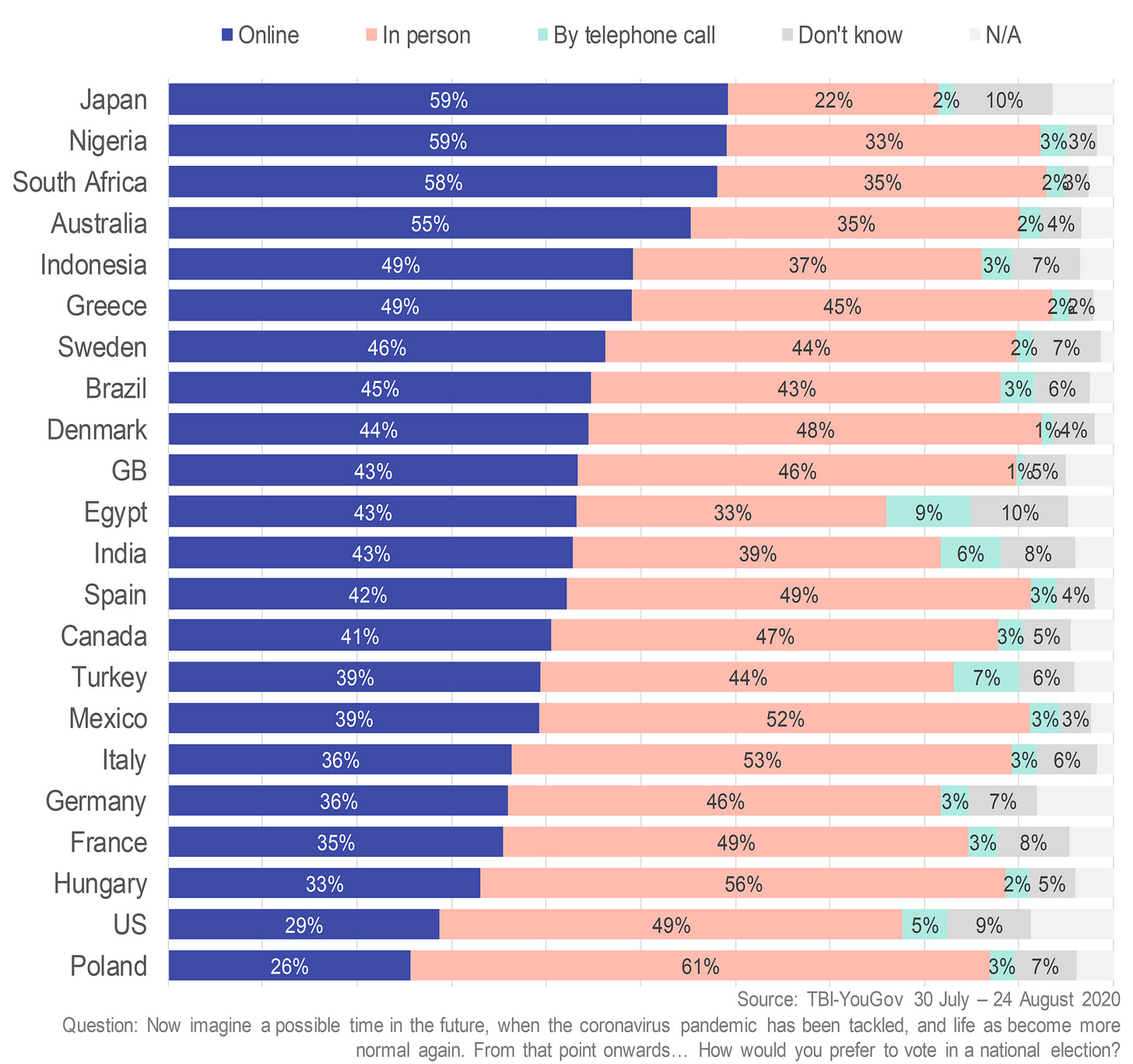What people really think about tech
Regulating tech companies matters to the public, but there’s much more at stake than just the future of social media
Hi, it's Chris from the Tony Blair Institute. In this edition we’re sharing some key insights from our recent research on people’s attitudes to tech companies, regulation and public services.
📣 We’re hiring! We have openings for tech policy leads across our portfolio of work, as well as for community managers and a strategy & operations lead. Locations span Europe (London), North America (San Francisco), Africa (Accra) and Asia (Singapore) » Read our team and culture deck » Apply by 29 November
🙏 If you enjoy this post please take a moment to share it on social media or forward it to someone who might find it interesting. Thank you!
🙋 Were you forwarded this issue? Subscribe now:
by Max Beverton-Palmer and Chris Yiu
The tech revolution is the central challenge of the 21st century, and a significant opportunity for the leaders that act on it: mastering its implications, accessing its benefits and mitigating its risks.
Too often, however, our political debates are pulled to the extremes. Some see technology as the silver bullet for a world held back by bureaucracy and inertia, without paying proper attention to questions of ethics and equity. Others veer toward a rose-tinted view of a world gone by, placing the blame for many of society’s problems on the internet and social media.
It’s quite possible, of course, to hold conflicting views about the tech revolution — and our latest research shows that this is also where most of the public find themselves.
Tech has a positive role to play in public services
Over the past six months we’ve conducted polling to look at how technology and tech companies are perceived by the general public. We’ve sought to ask questions within a broader societal context, placing tech companies alongside global institutions, other industries and public services.
In June we asked whether selected tech companies (and various comparator institutions) were a force for good or bad in the world. In new research published today with YouGov and researchers from Cambridge University, we asked about people’s views on how social media (and other key industries) should be regulated and about the role they thought technology and tech companies should play in public services.
Our findings show that while there is certainly a perception that social media is under-regulated across the world, particularly in Britain, Australia, the US, and Canada, this does not mean a push for heavy regulation or state control as a solution. And on public services we found overwhelming support across the world for large tech companies playing a role in improving key sectors such as health and education.
In almost all the countries surveyed (with the caveat that this was an online survey), going online to book an appointment with a doctor was more popular than any other option. Renewing a passport / ID card online rather than in person or on the phone was preferred in every country, as was applying for government benefits.
In countries where the desire for regulation of social media was strongest, such as Britain and Australia, support for large tech companies playing a role in public services was weaker. These findings could suggest that too little regulation of social media, in the public’s eyes, has an effect on confidence in tech companies’ ability to positively contribute to society in other ways.
Regulation should be enabling, not limiting
It seems clear that people around the world think social media needs greater scrutiny. As governments now move to impose specific regulation on social media and online platforms, there is a unique opportunity to craft a new approach fit for the 21st century. This must place more accountability on tech companies for the consequences of their decisions, but also empower them to play a more substantial part in enriching our society and public services.
Policymakers that grasp this can turn the power of tech and innovation toward the public good; tech companies that work alongside them will see that good regulation is enabling, not limiting.
The hardest part will be managing the politics of getting from where we are now to where we need to be. Dealing with a topic as complex as this requires effort and an open mind, but politics today is far more prone to knee-jerk reaction than nuance. An increasingly polarised debate about the future of tech — with politicians under pressure using regulation as a sledgehammer, whilst tech companies dig in and push back on anything and everything coming their way — only harms the policymaking environment and ultimately serves no one.
Because everything in the tech debate is so easily conflated, as the debate about regulating social media and online platforms intensifies all sides need to reflect on the damage a protracted fight will do to good policymaking, public sentiment and progressive ambitions over the longer term.
This is just as true in Europe as it is in the United States, and finding common cause on fit-for-purpose tech regulation would be a positive step for policymakers on both sides of the Atlantic. This matters in its own right, but also because it’s an opportunity to show the public that governments are ready and able to engage constructively with the world as it is today — and that tech companies will step up to play their part in building a better future with them.
Go deeper on our research
For a more detailed analysis of our findings read the following in-depth articles:
Tech Companies Have a Role to Play in Improving Public Services
Transparency and Autonomy Should Underpin Online Voting Systems
You can find out more about the project on our site and from our partners at YouGov.
Four key charts
1. Social media regulation
People in Britain were the least supportive of there being no specific regulation of social media.
Percentage of people who opted for ‘no specific regulation’ when asked what they thought the relationship with the government should be for social media companies
2. Public services
Across the countries surveyed, there is broad public support for a large or moderate role for tech companies in improving many public services.
Percentage of people who support a large or moderate role for tech companies in improving public services
3. Digital healthcare
How people would prefer to book a doctor’s appointment post-pandemic varies across the world.
Preference for booking an appointment to see a doctor after the pandemic
4. Online voting
At least a quarter of people in all markets surveyed would prefer to vote online in a national election.
Preference for voting in a national election after the pandemic





